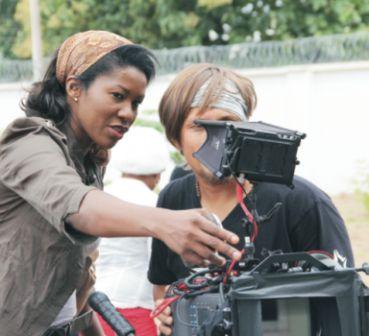Suffering in silence
At the age of 16, Isatu Kamara’s (name changed) parents withdrew her from school to be initiated into the traditional Bondo secret society. After going through the passing rites, her parents offered her for marriage to a polygamous rich man, hoping that he would transform their lives. (Photo: A Fistula survivor who is now cured)
However, when Isatu became pregnant a couple of months later her rich husband couldn’t care less about her to the dismay of her poor parents.
Isatu spent three days in labour, under the supervision of a traditional birth attendant (TBA), but couldn’t deliver the baby. The TBA wrongly accused her of being unfaithful to her husband by allegedly having an affair with another man.
Eventually, Isatu was forced to deliver a still-birth. Days later she started leaking urine uncontrollably, and she would continue living in that condition for years little realising that it was a consequence of her delayed and forceful delivery.
In medical terms, Isatu’s condition is called Vesico Vaginal Fistula (VVF) or obstetric fistula; a severe pregnancy related complication through prolonged, forceful and obstructed labour.
According to United Nations Population Fund (UNPFA) an estimated 2-4 million women suffer from fistula in low-income countries in Africa, Asia, South and Middle East, with another 50,000 to 100,000 women and girls developing the condition each year.
In Sierra Leone an unknown number of young women and girls suffer silently from fistula, said Dr. Alyona Lewis (the only female fistula surgeon in Sierra Leone) of the Aberdeen Women Center (AWC) – a treatment hospital based in Aberdeen, Freetown. In 2011, AWC screened a total number of 324 cases of which 238 were fistula patients. Similarly, since it was founded in 2002, the West Africa Fistula Foundation (WAFF) based in Bo has also screened more than 2000 fistula cases and provided surgery to more than 1500.
“Women and young girls, especially in rural communities, are suffering,” said Dr. Kabba Kebbay, Head of Reproductive Health at the UNFPA office in Freetown, Sierra Leone. “Fistula incidence is high and we need to increase access to services. Last year treatment centres were empty; but now they are beginning to full following the launching of a hotline (555) and other awareness raising activities by UNFPA partners.”
However, because of ignorance and associated stigma, many fistula patients are ashamed to come forward for treatment. According to Dr. Lewis, a fistula patient suffers from much more than a damaged bladder.
“Her whole person is damaged, and the impact is both physical and mental,” she said.
But there are also social consequences of isolation, stigma and abandonment which typically leads to inability to work and loss of financial support.
“My friends, relatives and even my husband – they all abandoned me,” Isatu narrated her ordeal. “I smelt awful all of the time as a result of the leaking urine and nobody could bear the stench of my presence. I kept to myself most of the time, away from community gatherings… ”
To get women like Isatu to come forward for treatment and spread the word about fistula and its prevention, an international NGO Health Poverty Action (HPA) is collaborating with AWC, WAFF, the Ministry of Health and Sanitation (MoHS), UNFPA and other organisations such as Haikal Foundation and Marie Stopes. At a one day conference hosted by HPA recently at the Cruzer Theatre, Lagoonda Complex, Aberdeen, Freetown, involving all of the partners, the issues of sensitisation, advocacy and prevention emerged clearly as the way forward to curbing fistula in the country.
It was further resolved that TBAs, whose lack of medical knowledge is a major cause of the fistula problem, should be repositioned; and that religious and traditional leaders should be engaged to talk to their communities, and that the media can be used more creatively to spread the word across the country.
“We cannot eradicate fistula until emergency obstetric care services are improved, but we can together create awareness of fistula in every village in Sierra Leone,” said Regina Bash-Taqi, Country Director HPA. “It is possible to find almost 90% of women with fistula in two years with the right resources.”
Another prevention strategy is to promote access to family planning methods. According to Mantie Tarawally – Private Sector Partnerships & Innovations Directorate Marie Stopes, by far the most important way of reducing or preventing fistula is simply by reducing the number of pregnancies.
“By itself, this is very effective; but it is important to pay simultaneous attention to improving obstetric care as well. Family planning and obstetric care should go hand in hand,” she said.
Meanwhile, Isatu and her colleagues were also at the one day workshop where they narrated their individual stories. A kind-hearted family member helped her to the Bo Hospital-Fistula Unit where her conditioned was repaired. Although she is still without a child, Isatu now proudly considers herself a role model and an advocate against fistula having gone through adult literacy training working as a volunteer.
By Ahmed Sahid Nasralla (De Monk)
Stay with Sierra Express Media, for your trusted place in news!
© 2012, https:. All rights reserved.



